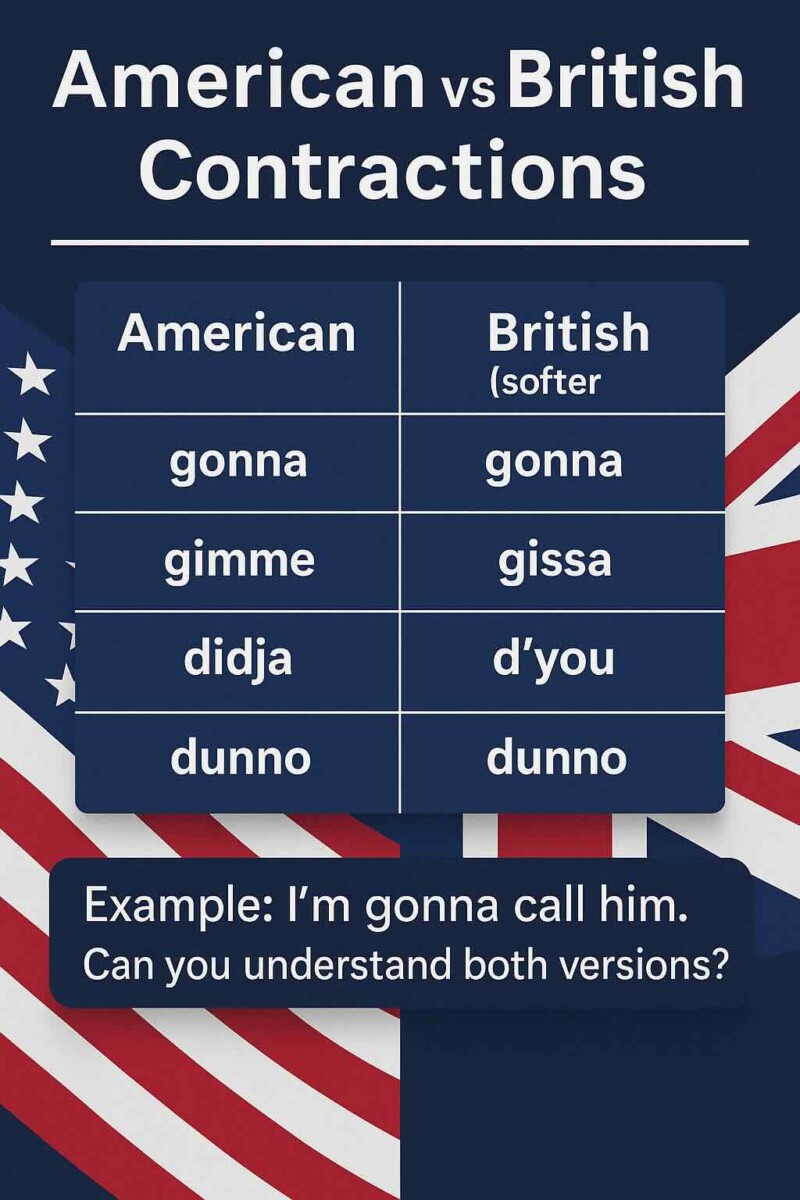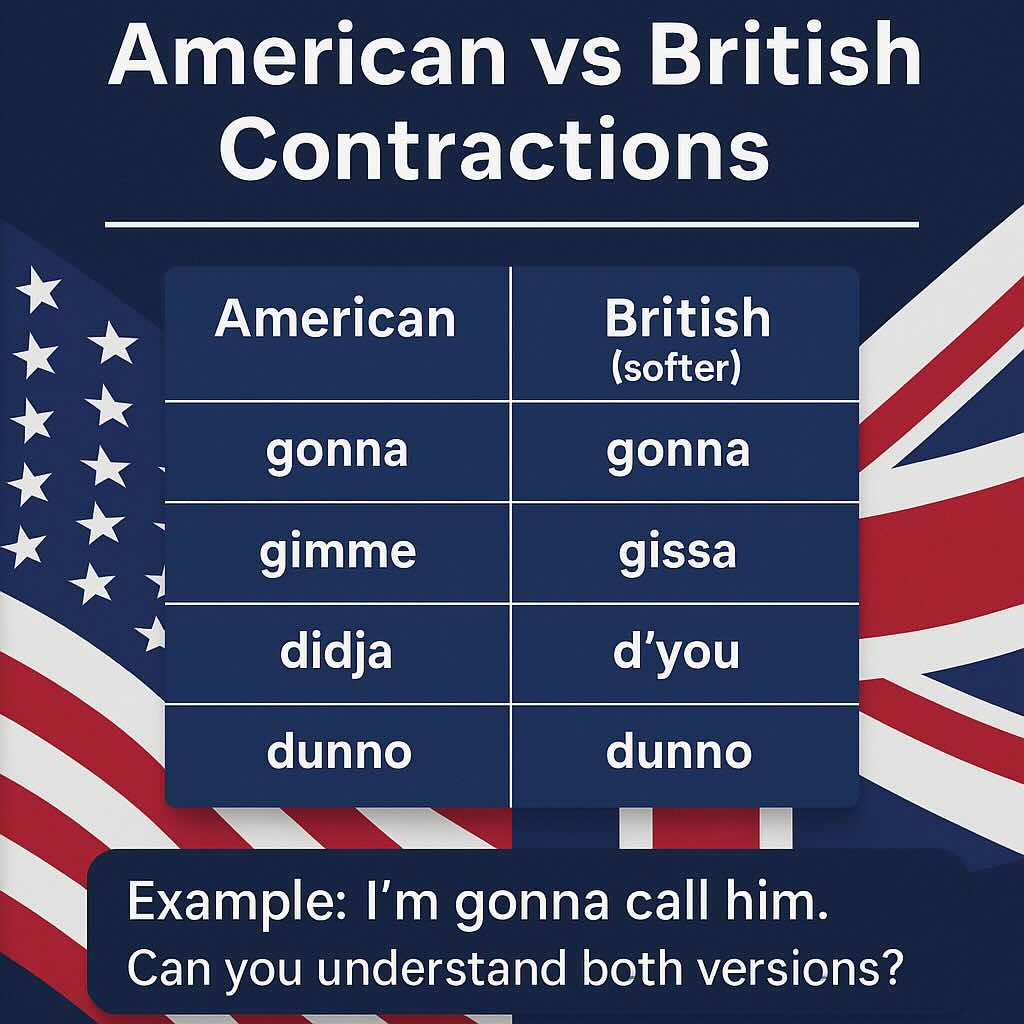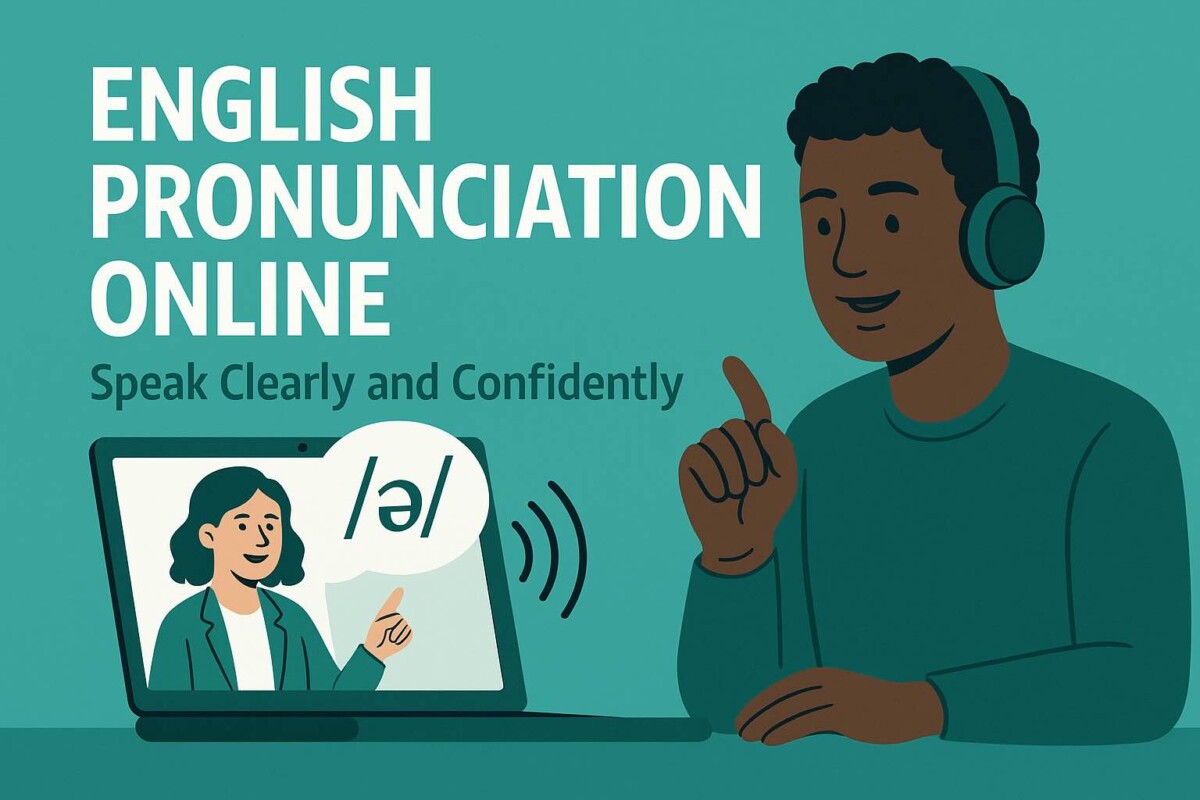🗂️ Category: Online Language Learning
🗣️ Introduction
Textbooks give you “proper English.” But in the real world you meet two living languages: Inglés americano y British English.
In the US, you’ll hear gonna, wanna, lemme. In the UK, it’s innit, wotcha, gissa.
If you want to understand movies, music, and everyday people, you need both.
🔑 Comparison Table: US vs UK
| Significado | American form | British form | Example |
|---|---|---|---|
| going to | gonna | gonna (softer) | US: I’m gonna call him. / UK: I’m gonna ring him. |
| want to | wanna | wanna (softer) | Do you wanna eat? (both) |
| let me | lemme | lemme | Lemme check. (both) |
| give me / give us | gimme | gissa (= give me) | US: Gimme a break. / UK: Gissa job. |
| did you / do you | didja | d’you / didja | US: Didja see it? / UK: D’you like it? |
| isn’t it | - | innit | UK only: Nice day, innit? |
| I don’t know | dunno | dunno | US: I dunno. / UK: Dunno, mate. |
| have to | hafta | hafta (less common) | US: I hafta leave. / UK: I hafta go. |
| supposed to | sposta | sposta (less common) | You’re sposta be here. (both) |
| aren’t you | - | ain’tcha | UK: You’re coming, ain’tcha? |
🟢 Gonna
- US: strong, universal in spoken English.
- UK: exists, but often softer [gənə].
- Trap: learners think it’s “American only.”
- What to do: recognize it everywhere, but avoid in formal writing.
🟢 Gimme vs Gissa
- US: Gimme a break! = Give me a break.
- UK: Gissa job! = Give me a job.
- Important: in Cockney, us = me, not “us.”
- Trap: students translate “give us” as plural. Wrong.
- What to do: know the cultural difference. Use gimme, recognize gissa.
🟢 Didja vs D’you
- US: Didja call her?
- UK: D’you like it?
- Trap: Do ya ≠ d’you. Wrong blending.
- What to do: listen carefully: [dɪdʒə] in US, [dʒə] in UK.
🟢 Innit (UK only)
- US: no equivalent.
- UK: universal tag: isn’t it.
- Trap: Brits use it in all tenses (He’s smart, innit?).
- What to do: don’t copy in exams, but learn to recognize it instantly.
🟢 Dunno
- US: I dunno.
- UK: Dunno, mate.
- Trap: tone differs — US more neutral, UK more colloquial.
- What to do: safe in casual talk, avoid in writing.
🟢 Hafta / Sposta
- US: common in speech.
- UK: appear, but less frequent.
- Trap: learners may think they don’t exist in the UK. They do, just softer.
- What to do: expect them in both accents.
🧬 X-ray of a Phrase
Do you want to go?
➡️ US: Do you wanna go? → Wanna go?
➡️ UK: D’you wanna go? → Wanna go?
Isn’t it nice?
➡️ US: Isn’t it nice? (rarely shortened).
➡️ UK: Innit nice? → Nice, innit?
📺 US vs UK in Pop Culture
- US examples:
- Friends — “I’m gonna tell you something.”
- How I Met Your Mother — “Didja call her?”
- UK examples:
- Sherlock — “D’you think so?”
- EastEnders — “Nice, innit?”
- Boys from the Blackstuff — “Gissa job!”
👔 Street vs Exam: Two Dress Codes
- US street speech: gonna, wanna, lemme
- UK street speech: innit, wotcha, gissa
- Exams/business: always use full forms — going to, want to, isn’t it, give me
🎭 Classroom Story
A student once asked:
“Teacher, I heard ‘gissa job’ in a British movie. Why ‘us’?”
Answer:
“In Cockney, us = me. Don’t translate literally. Just hear it as give me.”
Lesson: culture changes language — and you need both codes.
📝 Conclusion
US and UK contractions are not “wrong.” They are shortcuts of real speech.
- Learn them to survive in movies, songs, and daily talk.
- Use them casually with friends.
- Switch to full forms in exams, business, and writing.
📌 At Escuela de idiomas Levitin / Start Language School by Tymur Levitin, we prepare you for English as it’s really spoken — in New York y in London.

🔗 Related materials
- Why Americans Say “Gonna” Instead of “Going to”
- Why the British Say “Innit” and “Wotcha”
- Tymur Levitin — Teacher & Founder
✍️ Columna del autor
Author’s work by Tymur Levitin — founder, director, and head teacher of Levitin Language School.
© Tymur Levitin
























